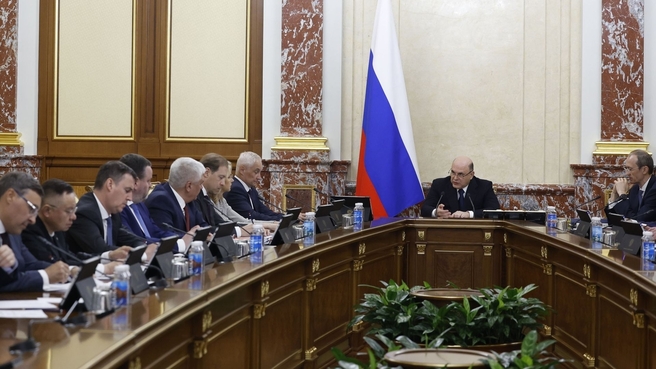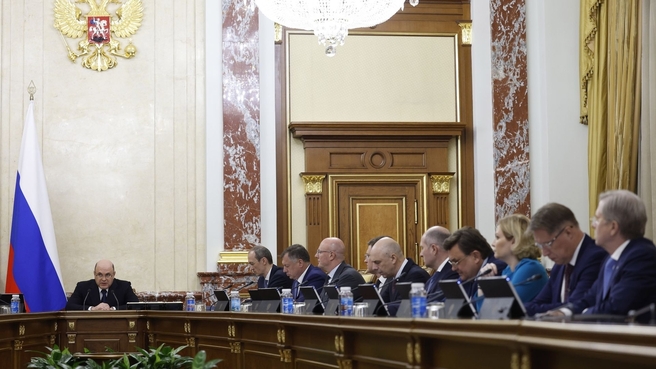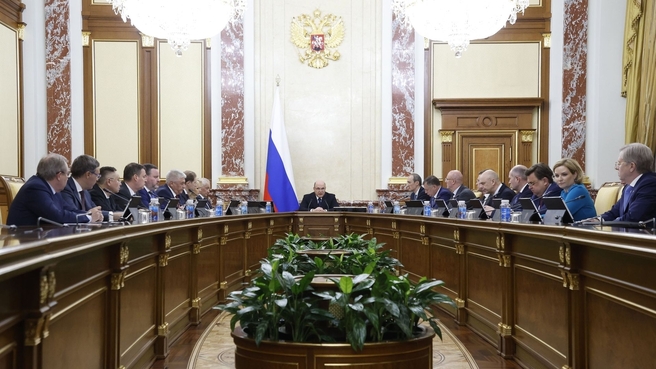Agenda: Results of the official visit to China, approval of the Concept of Technological Development until 2030, execution of the state funds’ budgets, additional support for the aviation industry.
Opening remarks by Mikhail Mishustin:
Colleagues, good afternoon.
Our visit to the People's Republic of China, at President Xi Jinping’s invitation, ended yesterday.
Russia and China are linked by historical relations, friendship and mutual respect. Our ties are getting stronger today, despite all the sanctions and our opponents’ actions.
In Beijing, I met with Chinese President Xi Jinping and the new Premier of the State Council, Li Qiang, to discuss the practical implementation of the agreements reached in March between our leaders, President of Russia Vladimir Putin and President of China Xi Jinping.
During the talks, we considered the widest range of areas for cooperation, including the development of modern technologies, innovations, the expansion of production capacities, the development of transport infrastructure, increasing its capacity, as well as increasing freight traffic. We discussed at length various aspects of the Northern Sea Route development.
We also discussed the creation of an independent system of financial settlements and talked in detail about ensuring food security. We discussed projects in energy, industry, and agriculture.
And of course, we considered interaction in education, science, culture, and everything that contributes to the strengthening of humanitarian ties, which are of great importance for people.
A number of bilateral documents were signed following the talks, including agreements on deepening cooperation in trade in services and on intellectual property issues.
I appreciate the extensive work done by representatives of the two countries’ business circles who took part in the Russian-Chinese business forum in Shanghai and agreed on new major projects.
Russia and China have a significant potential for joint activities in the petrochemical industry. We saw further proof of this when visiting the scientific laboratories of the Chinese corporation Sinopec, one of the global chemical industry leaders. We discussed the expansion of practical cooperation between research and educational institutions when visiting Beijing Tsinghua University, the largest in Asia.
It is very important to move forward in order to bring strategic cooperation between Russia and China to a new level. I would like to point out that everything the leaders of our countries agreed upon earlier must be implemented, brought to fruition, and translated into mutually beneficial projects for the benefit of the citizens of Russia and China.
Before turning to today’s agenda, I will mention one decision that has been taken.
The President has emphasised the need to significantly increase the capacity of the Russian economy, to stimulate the opening of new production facilities and the creation of new jobs.
On the instructions of the President, we have prepared a Concept of Technological Development until 2030. We worked on it at strategic sessions involving expert and business associations, major enterprises, research centres and regional representatives. Andrei Belousov was actively engaged in it. Of course, all the deputy prime ministers, ministers, heads of federal executive bodies, heads of state corporations, companies, and associations also actively participated in this effort.
The main task is to ensure technological sovereignty by introducing the results of domestic research and development. It is very important to ensure that innovation enables enterprises to outperform their competitors and to create an innovative model for the country’s economic growth.
A number of tools will be used for this purpose. First of all, we are talking about end-to-end technologies, which are important for many industries, about creating opportunities for businesses to make money precisely by means of new developments, and, of course, about the launch of industrial megaprojects, the implementation of which will ensure the formation of a long-term order for the introduction of critical technologies and the development of related enterprises, including for the production of key units and components.
Ten of them have already been approved. They are related to the localisation of the production of essential medicines, medical products, equipment, production of machine tools, electronic and radio-electronic products, ships and marine equipment, as well as the development of unmanned aerial vehicles in our country.
The total amount of investment in them exceeds 100 billion roubles, and in the near future the list of such projects may be expanded to include platforms for industrial poultry farming, as well as for the construction and road sectors.
The concept’s separate focus is on support for research projects, higher education and vocational training, including advanced engineering schools, as well as financial assistance to the production sector, including through state procurement and soft loan mechanisms.
We hope that, by achieving pre-set goals, it will become possible to double the share of domestic solutions (to almost 75 percent). The number of specialised innovation organisations will increase by over 100 percent, to reach 20,000. We will develop a system for supporting these companies (from their inception to their purchase by strategic investors), and this will make it possible to strengthen the country’s technological sovereignty.
It is important to implement all the required domestic research and development projects for manufacturing essential products.
Today, the Government’s agenda includes a topic on implementing the state funds’ budgets, specifically, the Pension Fund, the Social Insurance Fund and the Mandatory Medical Insurance Fund. Although sanctions exerted greater pressure on them in 2022, we ensured that the funds operated reliably and stably, and we fulfilled our obligations to citizens in full volume.
The Pension Fund’s assets made it possible to pay social benefits, compensations and, of course, pensions. As per the President’s instruction, we adjusted them for inflation twice, initially by over 8.5 percent, as well as by an additional 10 percent in June.
We have fulfilled our social insurance obligations and allocated over 820 billion roubles for paying all kinds of sick leave benefits, as well as maternity leave benefits.
Outpatient clinics, paramedic stations and hospitals continued to provide free medical services to patients in every Russian region. We have set aside about 2.8 trillion roubles for these purposes. Regional healthcare facilities received most of this sum, almost 2.5 trillion roubles. This made it possible to provide more affordable medical care, including high-tech treatment, the amount of which has soared by almost 16.5 percent.
It is important to continue doing everything possible, so that our citizens obtain the required state support on time.
I would now like to say a few words about another issue. The Government continues to prioritise assistance for the aviation sector. Due to unfriendly actions by a number of states, foreign airlines reduced their flights over Russia considerably. Nevertheless, the State Air Traffic Management Corporation provides air navigation services for at least one million flights.
Today, we will review the allocation of 5 billion roubles to facilitate uninterrupted servicing of flights over Russian territory. These sums will help ensure adequate safety levels and, what is highly important, retain skilled professionals.














